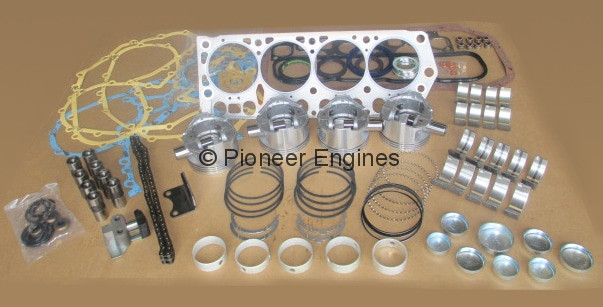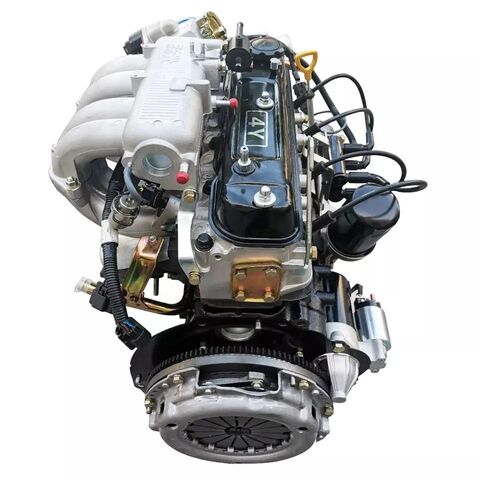Why the 4Y Engine Is Still Popular in Classic and Modern Vehicles
Why the 4Y Engine Is Still Popular in Classic and Modern Vehicles
Blog Article
Exploring the Various Sorts Of Engine: Which One Fits Your Demands?
Inner combustion engines proceed to control due to their reliability, while electrical engines are gaining grip for their sustainability. Hybrid engines provide a versatile compromise, and diesel engines stand out for their power in requiring applications.

Internal Combustion Engines
Inner burning engines (ICEs) are the foundation of modern-day transportation, powering a huge selection of automobiles from cars and trucks to aircrafts. These engines operate the principle of transforming fuel into power through a series of controlled surges within a burning chamber. The most common kinds of ICEs include fuel engines, diesel motor, and rotary engines, each developed to satisfy details efficiency and efficiency requirements.
Gasoline engines usually use stimulate ignition, while diesel motor depend on compression ignition, causing unique differences in gas effectiveness and power outcome (4y engine). Rotating engines, or Wankel engines, provide a compact layout and smooth procedure, however are less typically utilized in mainstream applications
ICEs have actually undertaken substantial advancements in technology, including the intro of turbocharging and gas shot systems, which boost total effectiveness and efficiency. Despite their efficiency enhancements, ICEs face increasing examination because of their ecological influence, specifically pertaining to greenhouse gas discharges. As the automotive market develops, the future of ICEs remains a topic of argument, balancing efficiency, performance, and ecological considerations. However, they remain to play a vital duty in international transportation framework.
Electric Engines
As problems concerning environmental sustainability and nonrenewable fuel source reliance expand, electric engines have become an engaging choice to inner burning engines. These engines use electrical motors powered by batteries or gas cells, supplying a cleaner and more reliable motive powers.
Among the key advantages of electrical engines is their decreased discharges. Unlike standard engines that shed fossil gas, electric engines produce absolutely no tailpipe emissions, substantially reducing air contamination and adding to improved public wellness. In addition, the efficiency of electric motors commonly exceeds that of interior combustion engines, transforming a greater percentage of energy from the source of power right into usable power for movement.
Electric engines are additionally significant for their silent procedure, making them excellent for city environments. 4y engine. The simpleness of their layout leads to less moving components, which can bring about lowered maintenance expenses and increased reliability in time
Nevertheless, challenges remain, including battery manufacturing impacts, charging framework, and range constraints. Regardless of these obstacles, the growing financial investment in electrical vehicle modern technology and renewable resource resources points toward an appealing future for electric engines, placed to play a vital function in the shift towards lasting transportation.
Hybrid Engines
Mixing the advantages of both conventional and electrical internal combustion engines, hybrid engines stand for a versatile remedy in the quest for efficient and lasting transport. These engines incorporate a gasoline or diesel engine with an electrical motor, permitting for enhanced gas effectiveness and lowered exhausts contrasted to standard automobiles.
Hybrid engines operate in several settings, utilizing the electric motor for low-speed driving and the inner combustion engine for greater speeds or when more power is needed. This dynamic operation not just enhances gas economic situation yet additionally adds to a smoother driving experience. Regenerative braking is one more critical function, capturing energy typically shed during stopping and redirecting it to charge the battery.

As customers progressively focus on eco-friendliness, crossbreed engines stand out as a sensible option, providing an effective balance of efficiency, effectiveness, and ecological obligation. This versatility makes them ideal for city commuting and long-distance traveling alike.
Diesel Motor
Effectiveness and power are hallmarks of diesel motor, which have long been favored for their robustness and gas economy. These engines operate the concept of compression ignition, where air is compressed to a heat prior to fuel is infused, igniting it without the requirement for spark plugs. This procedure makes it possible for diesel motor to achieve higher thermal effectiveness compared to fuel engines, translating into far better fuel gas mileage and lower carbon dioxide discharges.
Diesel engines are specifically well-suited for heavy-duty applications such as vehicles, buses, and industrial equipment, where torque and toughness are extremely important. Their layout usually consists of stronger elements to endure the higher pressures created throughout operation, causing longer life span and reduced upkeep costs.

Alternate Gas Engines
While diesel motor have long dominated the landscape of sturdy power resources, different gas engines are obtaining grip as feasible alternatives for an extra lasting future. These engines use a variety of fuels, such as pressed natural gas (CNG), hydrogen, ethanol, and propane, intending to lower greenhouse gas emissions and reliance on nonrenewable fuel sources.
One significant benefit of alternate fuel engines is their potential to lower carbon impacts. CNG engines give off fewer pollutants contrasted to conventional diesel engines, making them appropriate for urban transportation systems and fleets looking for to boost air top quality. Ethanol, originated from biomass, not only reduces emissions but likewise sustains agricultural economic climates.
Hydrogen gas cells stand for an innovative development in this realm, offering zero-emission power with a chain reaction in between hydrogen and oxygen. Obstacles such as infrastructure advancement and production prices continue to be challenges to prevalent fostering.
Final Thought
Finally, selecting the appropriate engine kind demands cautious consideration of details needs and preferences. Interior burning engines offer dependability, while electric engines focus on sustainability and lowered maintenance. Hybrid engines integrate the benefits of both, enhancing efficiency, whereas diesel engines supply superior power and torque for durable applications. Alternate gas engines present environment-friendly choices, albeit with prospective infrastructure obstacles. Inevitably, a thorough evaluation of driving practices and Clicking Here ecological worths will facilitate an educated decision concerning engine choice.
Crossbreed engines use a flexible compromise, and diesel engines stand out for their power in requiring applications. The most typical types of ICEs include fuel engines, diesel engines, and rotating engines, each created to meet specific efficiency and effectiveness needs.
Unlike traditional engines that burn fossil fuels, electrical engines create no tailpipe emissions, significantly decreasing air pollution and contributing to boosted public health and wellness.Hybrid engines run in several settings, utilizing the electrical look at this web-site motor for low-speed driving and the interior combustion engine for greater speeds or when even more power is needed. Crossbreed engines combine the benefits of both, enhancing performance, whereas diesel engines supply superior power and torque for sturdy applications.
Report this page